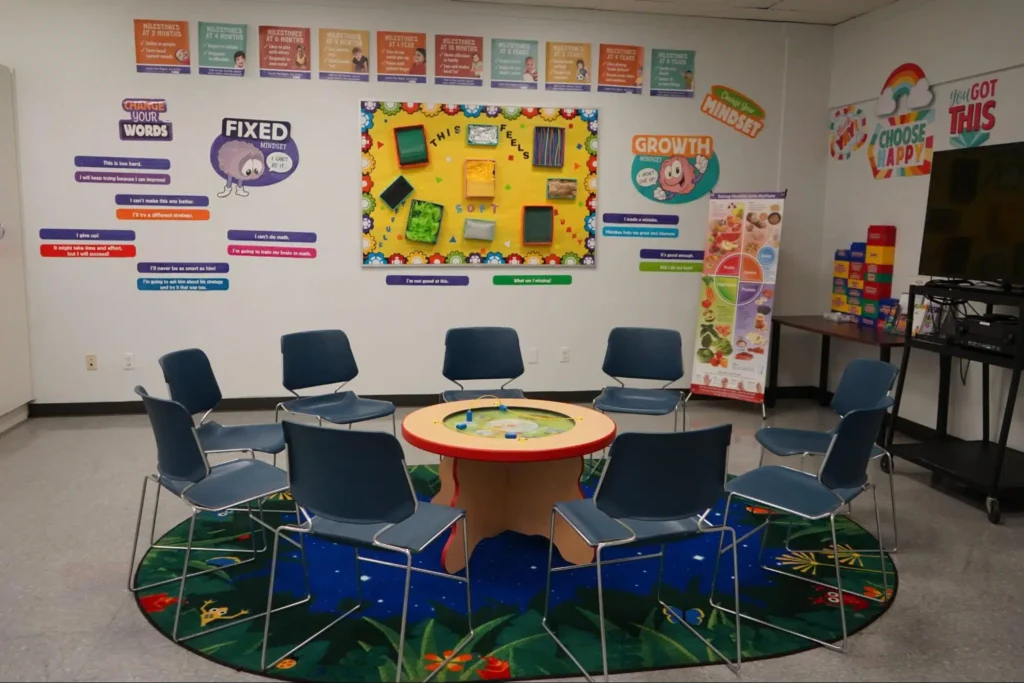The Essential Benefits of Early Childhood Education:
Building a Strong Foundation

There is an overwhelming benefit to students who receive Early Childhood education services, whether it is through a preschool program, a mixed delivery program, or a well-established daycare. Students who receive Early Childhood education services become equipped with critical skills that can help shape their future.
Many parents and educators will tell you that the benefits of Early Childhood education should not be ignored. Today, we’re diving into the details to learn more about the cognitive, social, and emotional benefits Early Childhood education provides our youngest and most vulnerable population.
Why It Matters: Benefits of Early Childhood Care and Education
In their formative years, children are like sponges, soaking up what they learn, see, and hear from those around them. Early Childhood educators and medical professionals will tell you that these formative years are some of the most important as a child’s brain is rapidly growing. Research tells us that over 90% of brain growth happens before kindergarten. During this time, children are learning to understand the world around them, how to interact with the world, and their place in it.
Early Childhood education programs allow children to have access to experienced and licensed educators who will help them to engage with the information they have access to. Children will also develop skills and strategies that allow them to process information. It’s this interaction with the world and intentional support that will allow a child to reap the benefits of Early Childhood education. So, what exactly are these benefits, and how do they impact the children in your community? Let’s take a look at some of the ways Early Childhood education benefits families, children, and societies as a whole.
Meeting and Exceeding Cognitive Development Milestones
An experienced childhood educator will guide a child to learn how to think critically, make connections, communicate, and create. In the Early Childhood education setting, this is often done through play-based learning, where children are empowered to interact with peers and the world around them in a safe, structured setting.
Some of the skills that are established when cognitive developments are met include:
- Asking about the world around them and making inferences or conclusions
- Exploring different methods to solve a solution
- Exhibiting problem-solving or negotiating skills with peers whenever an issue arises
- Self-advocating
- Having a sense of where their place is in society
- Exhibiting abstract thinking
- Expressing sequential thoughts
Screening and Identifying Health or Behavioral Concerns
In addition to helping children meet and exceed developmental milestones, Early Childhood education can serve as a tool parents and educators use if they have concerns about their child’s development.
Quality Early Childhood education programs will generally have screenings in place that can flag developmental concerns. This can help parents to get insight into learning disabilities, cognitive struggles, or motor struggles a child faces.
Building Blocks for Literacy Are Established
These formative years are critical for a child as they develop literacy skills and lay the foundation to understand more advanced skills in the future. During these years, children will begin building their vocabulary, improving sentence structure, and enhancing their overall communication skills.
In Early Childhood education, children will practice identifying letters and even simple sight words, preparing them for success as they enter kindergarten. It’s important to lay the groundwork for literacy skills because once a skills gap is created, it becomes increasingly hard to close that gap as a child gets older.
Social and Emotional Growth
A child’s social and emotional growth also grows by leaps and bounds during these formative years. A quality educational setting allows children to observe appropriate behaviors and practice their awareness regarding the feelings of others. This crucial growth allows children to be better problem solvers, stronger communicators, and more independent and proactive team players.
Self-Regulation
Self-regulation is a skill many adults struggle with, and when it comes to young children, it’s a skill that is never too early to start practicing. In the childhood education setting, children will be able to identify and recognize emotions. They’ll also be able to identify when these emotions are brewing within them. More importantly, children will develop the skills required to manage and navigate different emotions when they arise.
Short-Term Benefits of Early Childhood Care and Education
Parents and caregivers can quickly spot the short-term benefits Early Childhood education has on their kids. These benefits often include children being able to regulate their emotions, think critically about their experiences, introduce solutions to problems they are experiencing, and communicate productively with peers and classmates.
Long-Term Benefits of Early Childhood Care and Education
There are just as many long-term benefits for a child who receives Early Childhood education. These benefits include reduced risk of repeating grades, becoming more academically prepared as they progress through school, being up to 25% more likely to graduate from high school, and becoming a high earner in the workforce.
One of the most well-known studies, the Abecedarian Early Intervention Project, looked at two groups for more than 35 years. One group received Early Childhood education, while the other did not. The results indicated that children who received Early Childhood education were more successful academically and financially. Additionally, these individuals also exhibited better mental and physical health overall.
Make Your Impact in Early Childhood
Become a change-maker in the lives of young children when you pursue a career as an Early Childhood educator. At Sunrise Children’s Foundation, we are committed to helping families and staff discover success in Early Childhood education.
Contact us today for more information about Early Childhood education.

